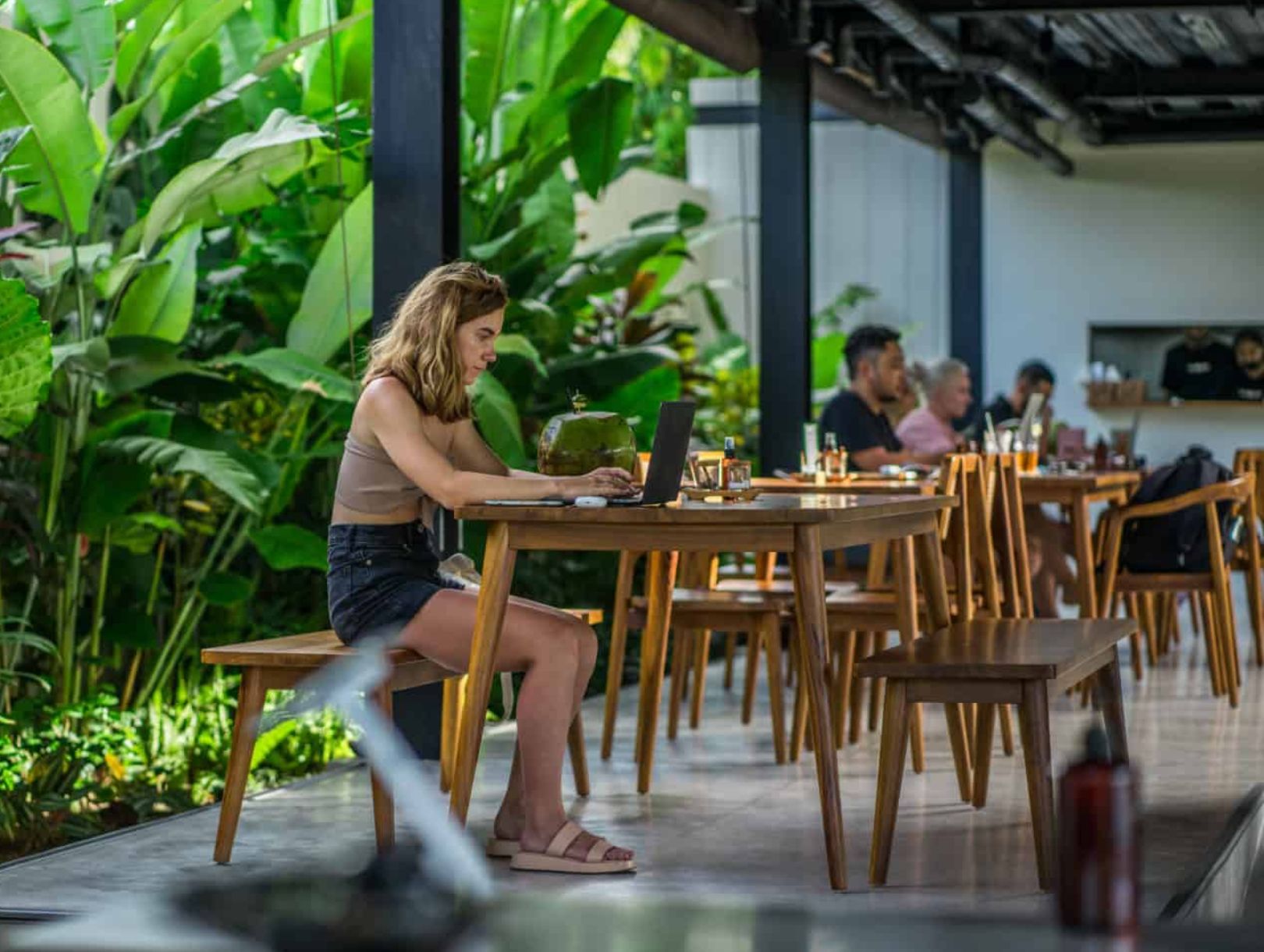
The Broke Backpacker is supported by you. Clicking through our links may earn us a small affiliate commission, and that's what allows us to keep producing free content 🙂 Learn more.
Why Bali is Great for Digital Nomads
Basing yourself in Bali is an exquisite idea for remote workers.
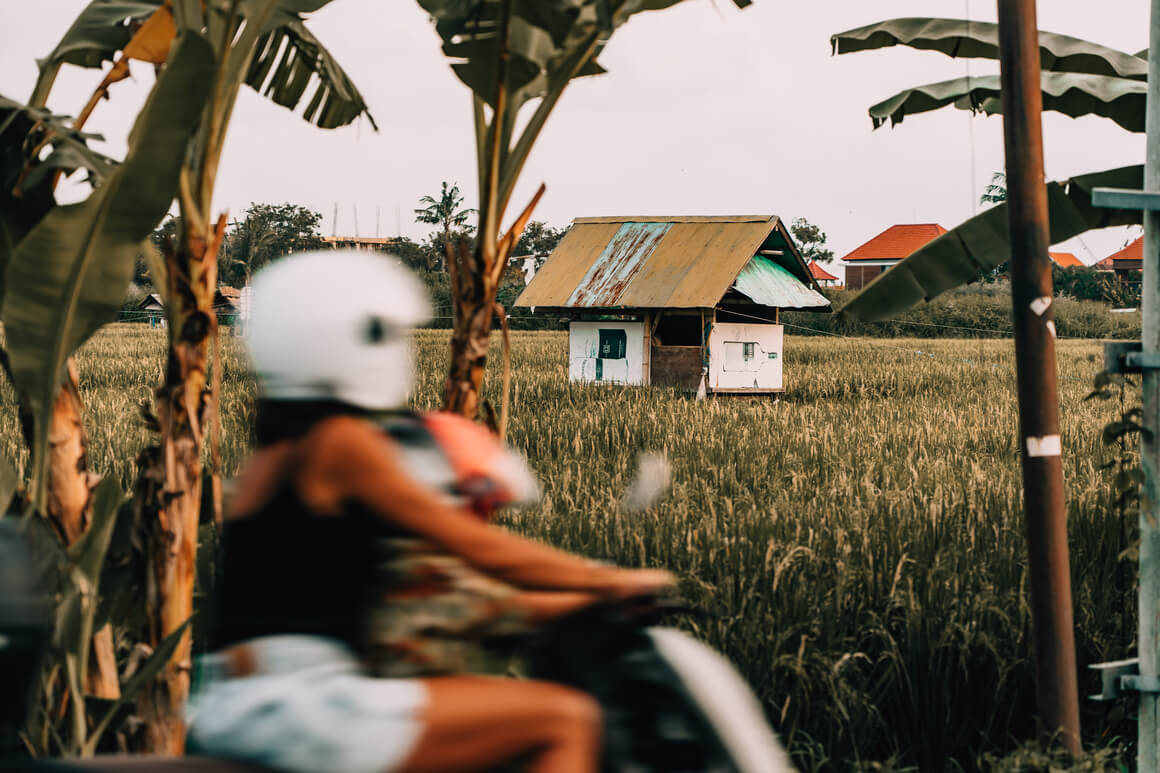
Image: Nic Hilditch-Short
From immersing yourself in the natural beauty of the place to visiting beautiful sites, and celebrating vibrant festivals, there’s something for everyone!
Located just below the equator in tropical Southeast Asia, Bali is blessed with warm weather year-round. However, like all tropical destinations, the island receives a wet and dry season instead of a classic summer and winter. While the weather is warm, humid, and sunny throughout June, July, and August (dry months), monsoon rains hit the island during the wet season in December, January, and February.
On top of this, the Indonesian government makes it relatively easy to visit the island for long periods of time. A B211a Business Visa permits digital nomads to stay in the country for up to 60 days with the option to extend the visa for an additional 60 days, two times. In total, you could spend six months living in Bali on this visa without being obliged to pay local taxes.
If you want to stay longer than six months, Indonesia has revealed a new ‘Second Home’ visa that can allow ex-pats to stay and work remotely as a digital nomad in Bali for up to five years. Of course, a valid passport and stable income will need to be presented to receive this visa.

Unlock Our GREATEST Travel Secrets!
Sign up for our newsletter and get the best travel tips delivered right to your inbox.
Awesome Community Is Awesome
Honestly, there are so many reasons why this is one of the top TOP places for digital nomads worldwide and why so many people want to live and work in Bali. I always thought it was SO basic. Everyone goes there, right? Not me! Instead, I went to Ukraine, Azerbaijan and Liechtenstein. Then I got super lonely because there were no other nomads and decided to follow the footprints of those wiser than me.
Turns out that being basic might be a strength.
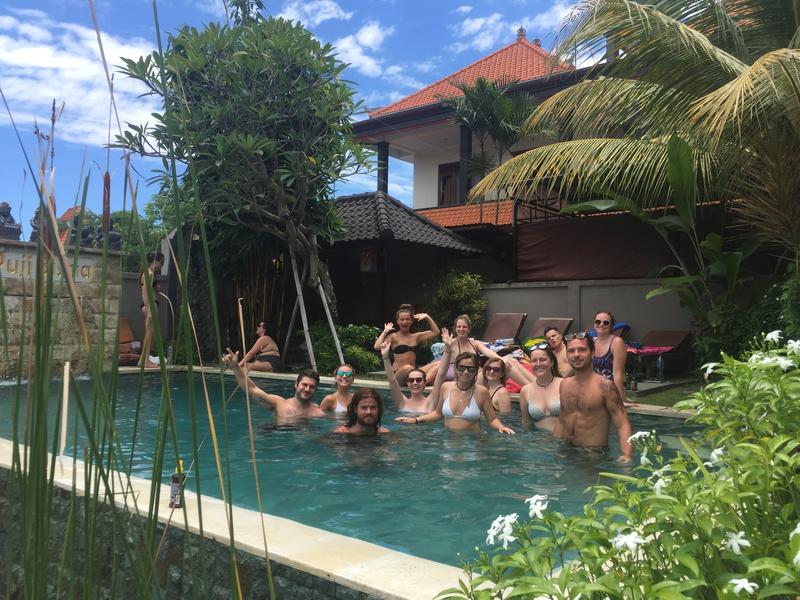
Photo: Elina Matilla
All roads lead to Bali eventually, at least if you’re a digital nomad. It is a true intersection for all kinds of nomads from all over the world. Because of this diversity and the sheer number of people, you’re sure to find your tribe.
And I’m not only talking about your everyday surfers, models and yogis – although if you are one, congrats! You’re gonna go absolutely bonkers about Bali. No, the community has space for everyone: entrepreneurs, hippies, crypto bros and babes, artists, scientists, climate warriors and nerds.
Being a digital nomad in Bali has led me to some really incredible, wholesome friendships.

A specially built co-working hostel?
Tribal Hostel Bali is finally open – this custom-designed co-working hostel is an absolute game-changer for digital nomads, wandering entrepreneurs and excitable backpackers alike…
Is this the best hostel in the world? We think so… Come check it out and see if you agree 😉
The Cost of Living is Low (For Westerners)
One main factor that’s great for digital nomads is the low cost of living in Bali. You could set yourself up in a gorgeous villa with air conditioning, a swimming pool, and a motorcycle and purchase high-grade groceries for a fraction of what you would spend elsewhere.
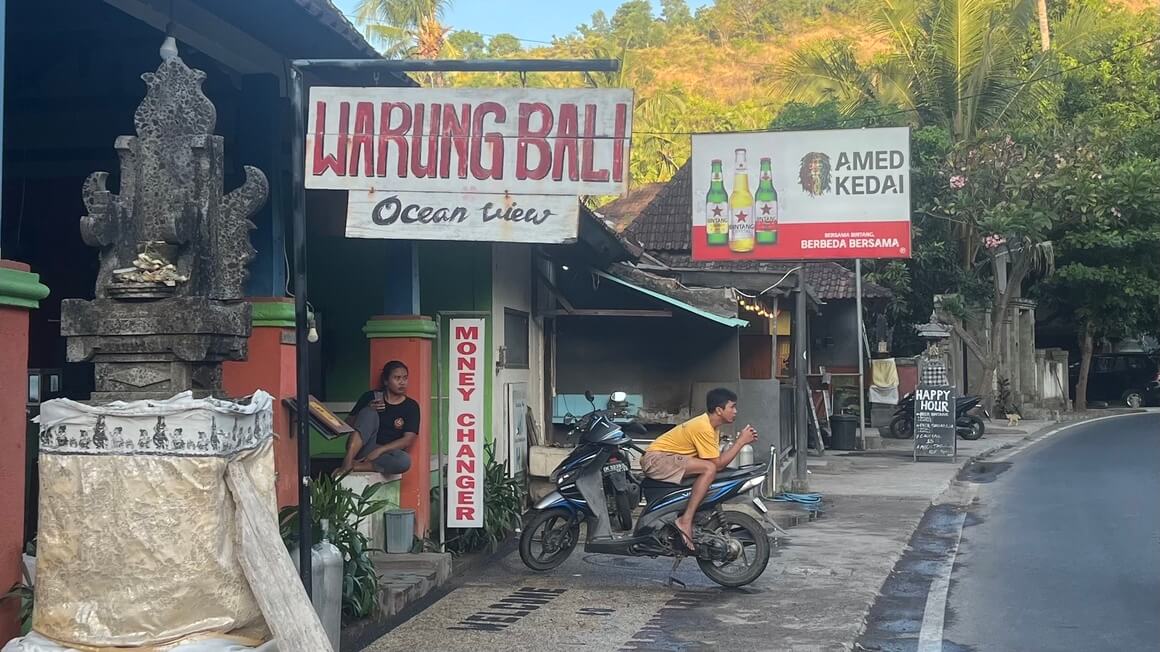
Photo: @joemiddlehurst
Depending on the quality of life you’re after, you can expect to spend between $720 and $2,000 per month per person living in Bali. If you’re a couple or are traveling with a friend or family member, you could save a significant amount on sharing rental costs.
If you live humbly, eat local food, and enjoy the beautiful outdoors as your main form of entertainment, you could easily save on costs compared to living in a Western country with a luxury lifestyle.
Find out how much your money is worth today by using the up-to-date converter below.
- A meal at an inexpensive local restaurant (known as Warungs) will cost you around $1.70. A three-course meal at a mid-range restaurant targeted towards tourists might cost around $20, while a coffee at a cafe will cost approximately $2.20.
- Rent for a small one-bedroom apartment in a desirable neighborhood could set you back $430 per month or as little as $240 for a place outside the busy tourist areas. Utilities (including cooling, water heating, garbage, etc) could cost around $50 per month.
- The easiest way to get around while living in Bali is by renting a scooter or motorcycle. Alternatively, taxis are available and cost about $1 per mile.
- Most activities are nature-based and don’t cost a penny. Membership to a fitness center might cost $5-$20 per month, and renting a tennis court for an hour costs around $10.
- When it comes to groceries, a bottle of milk should average $1.50. A dozen eggs cost around $1.50, while a bottle of wine is more expensive at about $20. Beef is the most expensive meat on the island since it is not eaten by locals and costs around $12 for a kg of beef.
There Are So Many Different Things to Do. SO MANY!
This might be a small island but it packs a lot in a punch. Before I’d lived there, I thought all jungles and beaches makes Elina a dull girl, but there’s so much you can do with that.
World-class snorkelling and diving? Yep. Partying it up and seeing art exhibitions? Yeah, duh. You can even find some pretty great hiking, and even if it’s not the Alps, it doesn’t mean it’s any worse. There are SO MANY things to do in Bali.

Photo: @amandaadraper
You can also pick to live in a hub that best suits you. If you want to work from Bali, Canggu is the best IMHO. There are heaps of epic hostels to stay in while you get the vibe and decide whether Canggu is for you.
You can find pretty much anything your little heart could desire, including minigolf, escape rooms, go-karting, paintball and so much more you never thought you’d find. (Then you gotta figure how to find time for your remote work in Bali with all this play…)
With chill city culture in a town-sized bite and tons of good food, you’ll find heaps of things to do in Canggu. Ubud is also cool if you prefer quiet and nature. Uluwatu is rising up now, and it’s basically a hilly mini-Canggu.
And if you get sick of all the awesomeness, it’s super easy and cheap to hop on a plane on go explore the rest of Indonesia.
Before You Rush off to Go-Karting… Make Sure You’re Insured
You never know the trouble and strife that the road can throw at you. Even though as a digital nomad your life might be slightly cushier than that of a daredevil backpacker, you should always consider having a good travel insurance policy in place. (After all, home is where most accidents happen!)
The best travel insurance out there for digital nomads is Safetywing. They’re a go-to choice of coverage for long-term travellers, working travellers, and, particularly, long-term stayers without much of an itinerary.

Photo: @amandaadraper
Safetywing’s unique gist is that they offer a hybrid of travel insurance and health insurance. Safetywing doesn’t, unfortunately, cover electronics and valuables, but it’s a super simple form of international health insurance, good to go from anywhere itinerary-free (except the USA), to cover yo’ ass.
Plus it’s CHEAP and on a month-to-month basis. Read our SafetyWing Insurance review or visit their site by clicking below, then piss them off at any time!
Month to month payments, no lock-in contracts, and no itineraries required: that’s the exact kind of insurance digital nomads and long-term traveller types need. Cover yo’ pretty little self while you live the DREAM!
SafetyWing is cheap, easy, and admin-free: just sign up lickety-split so you can get back to work! Click the button below to learn more about SafetyWing’s setup or read our insider review for the full tasty scoop.
The Lifestyle is Just Too Damn Great
I told my friends that I was coming back to Bali because I missed them, but really, it was for the 6-dollar massages and all-inclusive housekeeping. (Please don’t tell them I said that.) Bali is possibly one of the best places in the world for digital nomads purely for the amazing standard of living.
The work-life balance is really something else. Seriously, the digital nomad lifestyle is not quite this good anywhere else. Living in Bali makes it easy to go to yoga or surfing in the morning, get your work done in the day, and squeeze in a Crossfit session after work before grabbing drinks with friends. It’s simply awesome.
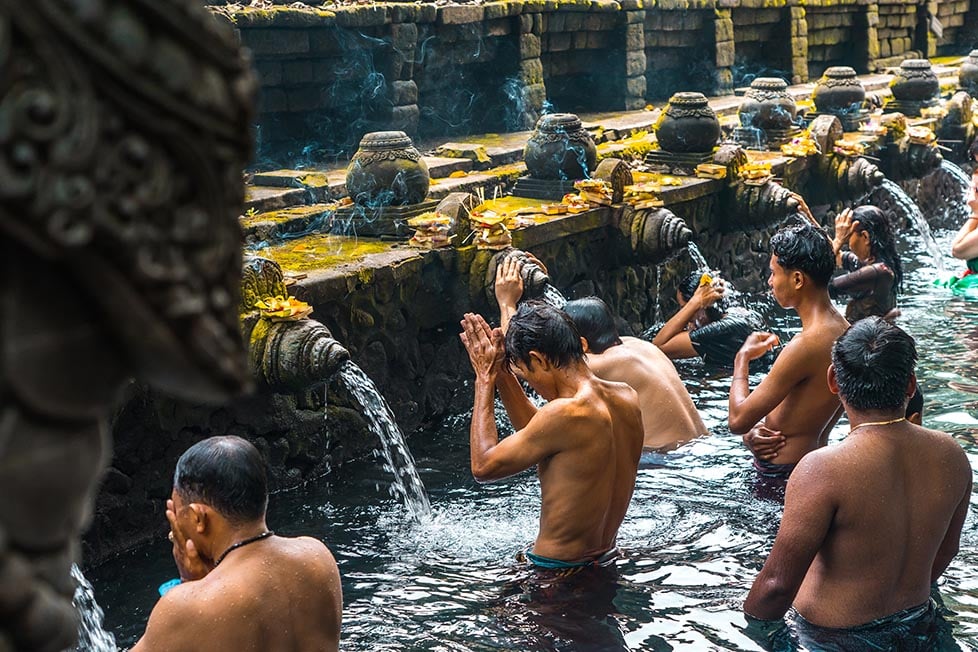
Image: Nic Hilditch-Short
The cost of living in Bali for a Westerner is very little; living cheaply and luxuriously is easy. Most nomads live in villas and guest houses and have a maid that comes clean the place a few times a week. Food is delicious, plentiful, and above all – cheap. I’ve barely cooked for myself for a year!
I do get a little bit bored with how great everything is, but then I go suffer somewhere else for a few months, and soon enough I’m ready to jump right back to the life of a Finnish Queen Abroad again.
Want to save money on accommodation?
Enjoy 15% OFF on stays ALL around the world.
Work in Bali as a Digital Nomad
Then to the bones of being a digital nomad – work. Bleh, said no digital nomad ever, cause we tend to actually like our jobs. Something about carving your own path and creating your dream life, I hear.
Here are some things you should know about remote work in Bali.
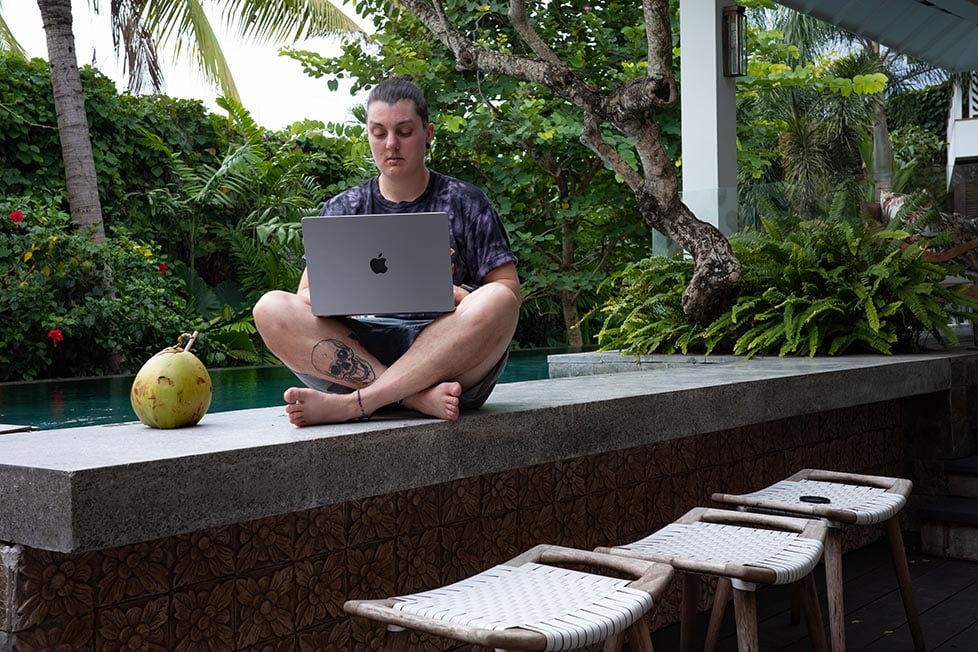
Image: Nic Hilditch-Short
Work Has Never Gone Better
Dutiful digital nomads will be happy to hear that Bali is an excellent place to hunker down and get some work done.
The general atmosphere makes it easy to motivate yourself to work – you know, since you’re surrounded by nomads all the time, and you’d feel bad if you were slacking off while everyone else is making money. As a digital nomad in Bali, I got the chance to really focus on my work in a way that I’d never done before.

Work from Bali is also an excellent option for nomads who are just starting out and still looking for their digital nomad job. There are many newbies on the island so it’s easy to find workshops, support groups and even business coaches if you’re so inclined to kick-start the sweet, sweet life of a digital nomad.
It’s also easy to focus when there are so many awesome, cozy cafés and coworking spaces in Bali to work from. But more on that in the next chapter…
On top of that, networking opportunities are plentiful. I always thought networking wasn’t for me, because who was gonna hire a Finnish translator on an Indonesian island. Then I met Will and he was so dazzled by my unparallel talent (exactly how that happened, don’t question it) that he got me writing for The Broke Backpacker. And here I am now! All thanks to Bali!
Internet and Wifi
Internet is… well, it’s good, for the most part, when it is good. In general, it’s pretty trustworthy, and you can find good wifi everywhere: in cafés, hostels, apartments, etc. Bali wifi passes the “Netflix test”: you can stream, upload and download stuff pretty painlessly.
Bali is still a tropical island, though, and sometimes an ambitious rain storm temporarily wipes out the net. Not to worry: it’ll probably be back in an hour.

Image: Nic Hilditch-Short
Luckily, phone plans are really cheap, and you can get a good data package for the rare cases when the internet gods turn their backs on you.
Indonesia is also a pure-minded nation, and certain adult websites are blocked… I’m talking about Reddit, what did you think I was talking about? So get yourself a good VPN!
Looking for the perfect retreat/gathering villa?
This truly special and brand-new villa features a gym, sauna, and ice bath. If you’re looking to host a retreat or get a big group of friends together, it’s an amazing choice… it fits up to 20 people.
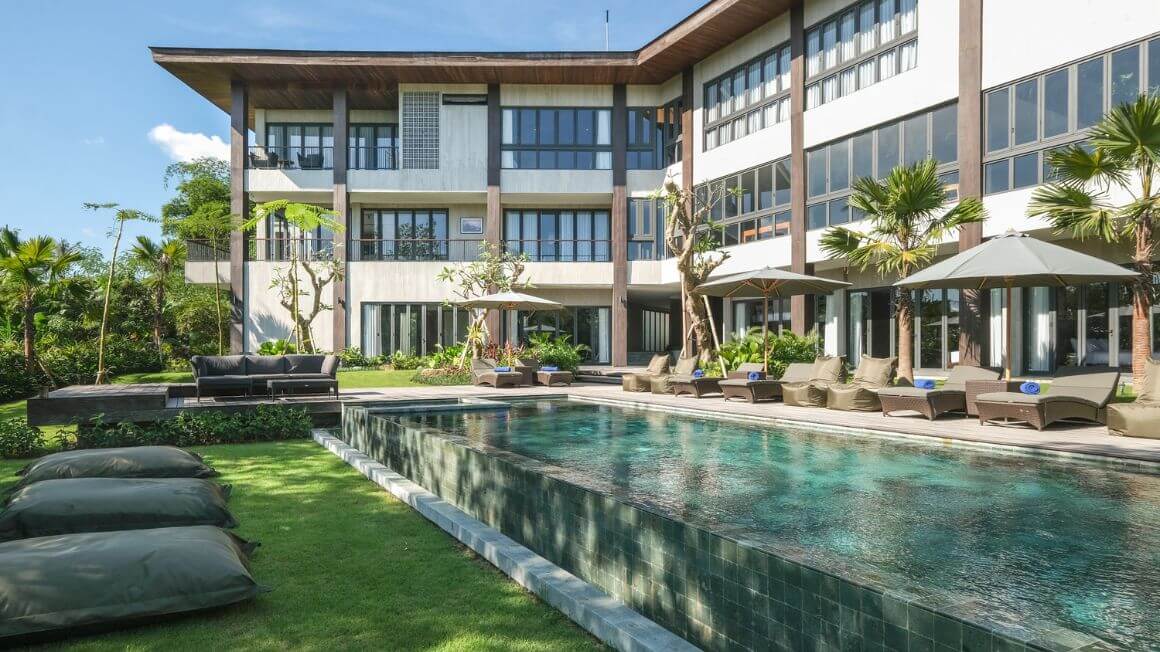
Check it out on AirBnB or contact the owner directly (a friend of the site) at +62 853-3706-6958 and you can get a 10% discount by mentioning you came through The Broke Backpacker.
Work Spots and Coworking Spaces in Bali
Thanks to omnipresent wifi, there’s no shortage of awesome work spots for digital nomads in Bali. You can easily set up a home office at your villa or guest house, or work in the garden.
Another popular option is cafés that the most popular nomad hubs are chock-full of. Cafés with delicious, delicious smoothie bowls, comfy seats and a plethora of plugs… These spots might have been designed in digital nomad heaven because they fit just right.
Tons of digital nomads also like working from Bali coworking spaces because it’s pretty much the best way to inch yourself into the community if you’re a poor lonely soul with no friends yet. Most coworking spaces in Bali offer events like members’ lunches, movie nights and Indonesian lessons. You go for work – you stay for friendships.
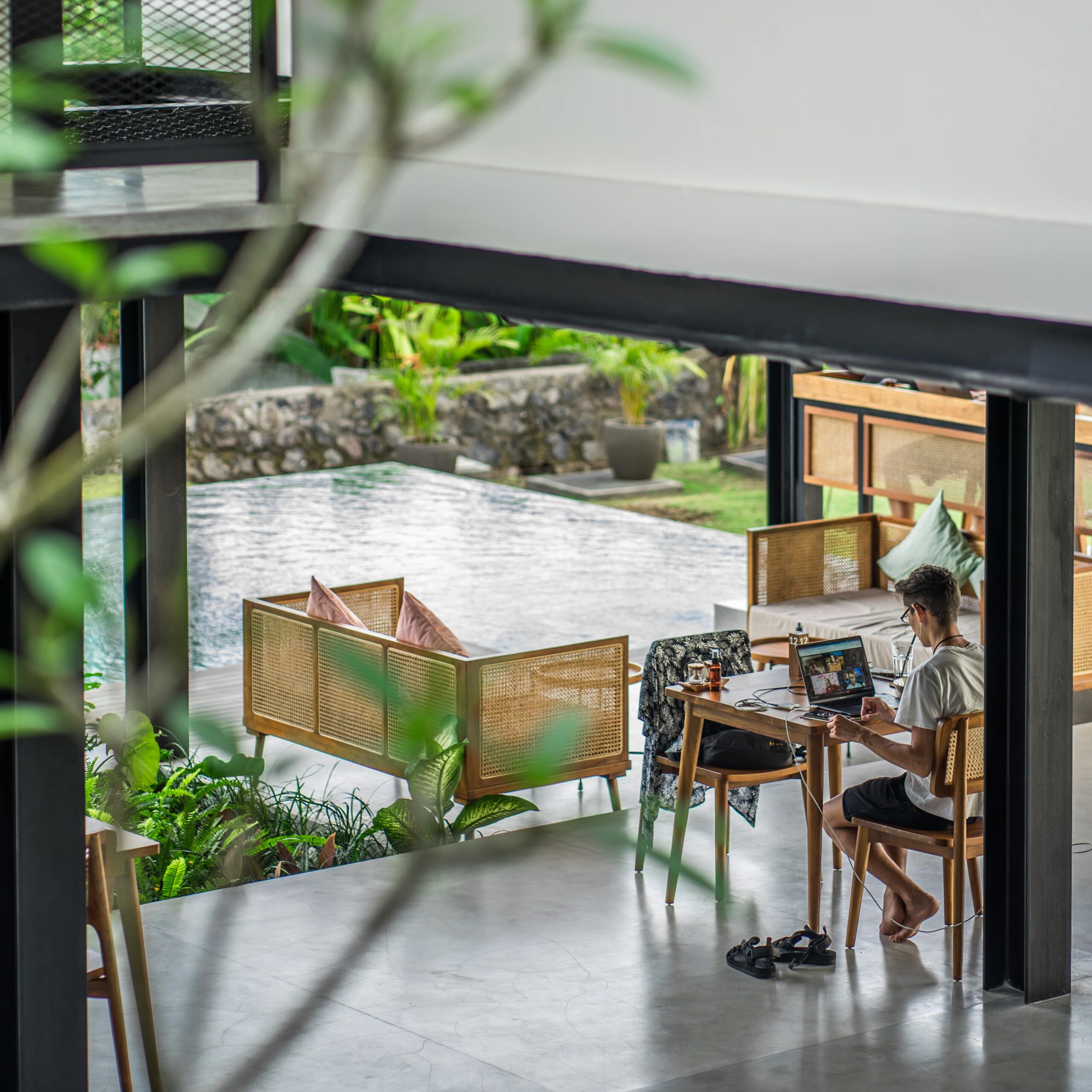
Photo: Tribal Bali
One of my new favs is Tribal Hostel Bali. Tribal is the perfect spot for digital nomads, laptop lifers and online entrepreneurs to work hard and play hard at one of the best coworking spaces in Bali.
They’ve got a gigantic pool, delish food, legendary cocktails (ask for the signature Tribal Tonic!), an electric-pink billiards table and all-around grand vibes to keep you entertained between business calls.
Tribal Hostel is Bali’s first custom-designed, purpose-built coworking hostel so it’s one of the best places to link up with the beautiful community of digital nomads in Bali.
What It’s Really Like Living in Bali
So, what is it like living in Bali’s tropical haven of lush greenery and gorgeous beaches?
As mentioned, there is a massive ex-pat community in Bali. Many of Bali’s ex-pats are Australian nationals who moved to the nearby island for its great surf culture and weather. That said, you will find people from all corners of the Western world living here, and most tend to live in and around Canggu, Ubud, and Uluwatu.
The most widely spoken languages on the island are Balinese and Indonesian, although Indonesian is the only official language on the island. With a growing tourism sector, most locals have learned to speak English, making it easier for them to find work on the island.

Bali is a relatively easy island to visit on most passports. There is a visa available to enable you to stay in Bali for an initial period of 60 days, with the chance to extend this visa twice (ultimately staying in the country for six months). Since this is not a multiple-entry visa, you must reapply every time you depart and reenter the country.
If you’ve done any research, you’ll notice that Bali is tiny. However, getting from point A to B can take a long time when living in Bali, even when crossing a short physical distance. The main airport on the island is in Denpasar (right in the heart of the island between the Bukit Peninsula and Canggu). The airport is called Ngurah Rai International Airport and welcomes flights worldwide and within Indonesia.
At the arrivals terminal, plenty of safe, affordable taxi drivers wait to take you to your destination. Alternatively, you could arrange private transfers in advance (there is no public transport). For example, the drive from the airport to Canggu is only 11 miles, yet it will take around an hour to drive in a car. This drive will cost between $12 and $15. A taxi to Ubud (slightly further north) costs around $20 for the hour-and-a-half drive.
Although the island is pretty close to a paradise for most, it is still a developing nation with its fair share of poverty. Do know that the island can get very overcrowded with tourists when the busy season hits.

A new country, a new contract, a new piece of plastic – booooring. Instead, buy an eSIM!
Jetpac eSIMs work just like an app: you download it, pick your plan, and BOOM! You’re connected the minute you land. It’s that easy.
Read about how e-Sims work or click below to see one of the top eSIM providers on the market and ditch the plastic.
Grab an eSIM!Hot Tips for Hot Bali Nomads
Are you fervently looking into your options to get to Indonesia as fast as possible already? Slow down, cowboy! There are still a few last tips that I want to leave you with so that you’ll survive the start of your Bali life and have the most epic of times.
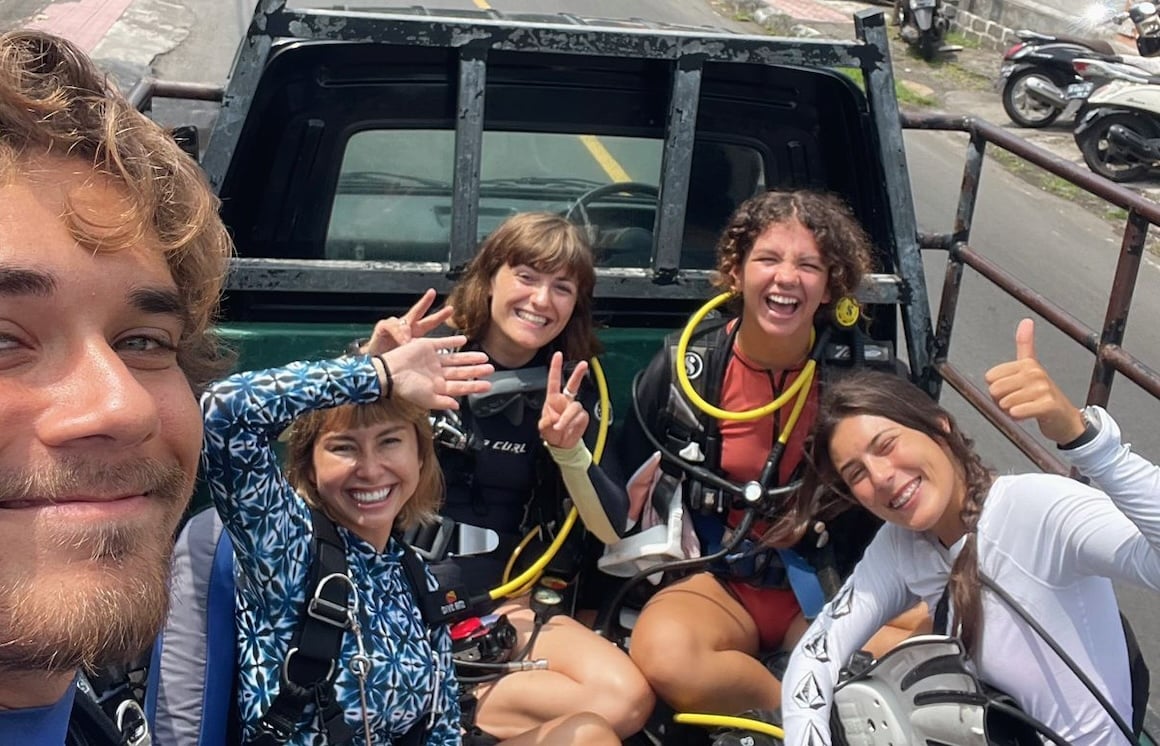
Photo: @audyscala
- Get a scooter. Like, seriously. The traffic is scary at first but you’ll pick it up quickly, and once you get the hang of driving in Bali, you’ll be zooming all over the place with the wind in your hair & freedom in your heart.
- Join a Bali coworking space. When you’re the new kid on the block, the best way to meet your new best mate is by joining one of the many coworking spaces in Bali like the Tribal Hostel.
- Join some Facebook groups. Facebook groups are the best way to sell and buy second-hand stuff, ask (stupid) questions and find accommodation. Bali Digital Nomads and Canggu Nomad Girls are great for general advice, Stay in Bali for staying long term.
- Learn Indonesian. You can pretty easily get by with English if you only hang out with white Westerners (bleh) but Indonesian is easy to learn, super useful AND on Duolingo so you really have no excuses.
- Don’t foster a pet. There are tons of homeless strays that need love and care… but if you think you can foster a cute puppy or kitten for “just a few weeks” and then find them a new home, I’m sorry, you’re wrong. I’ve been “fostering” my cat Gizmo for a year and a half now. I think at this point I just have a cat. Well, I guess now I HAVE to keep coming back to Bali… Poor me…
Fuck It, I’m in Love with Bali. Can You Blame Me?
So, why should you move to Bali?
Why shouldn’t you?
When people ask me where I live and I have to say “Bali” like the basic white bitch I am, the hipster that lives in me still cringes a little bit. But you know what? I love palm trees. I love sunset walks. And I love smoothie bowls in cafés where I can work all day next to all my cool nomad friends.
A couple of years ago I never saw myself even visiting this place. Now I’m spending annoying amounts of money to get back as soon as I can and dropping all my other plans just to be able to stay on the island of Gods. I kinda hate how much I love Bali but goddammit – I do.

Photo: Elina Matilla
Maybe it’s white-vagabond-voodoo, or maybe the island actually holds some magic like so many backpackers and nomads claim it does. If something could make me believe in magic, it is this. What else could convince a grumpy hipster to exchange offbeat mountain trails to coconuts and bikinis?
I mean, I have given you enough reasons here to show just what makes this little island so special. Maybe the attraction comes from all those things, or maybe it’s just magic. I’m not too sure myself, so I can’t tell you definitely.
I guess you’ll just have to come and see it for yourself.
Buy Us a Coffee!
A couple of you lovely readers suggested we set up a tip jar for direct support as an alternative to booking through our links. So we created one!
You can now buy The Broke Backpacker a coffee. If you like and use our content to plan your trips, it’s a much appreciated way to show appreciation 🙂







